|
|
|
Sort Order |
|
|
|
Items / Page
|
|
|
|
|
|
|
| Srl | Item |
| 1 |
ID:
164068
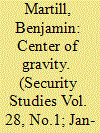

|
|
|
|
|
| Summary/Abstract |
Cold War strategy in Western Europe almost exclusively followed the US policy of containment. Conventional explanations for this continuity, however, fail to account for both the strategic rationale and the scale of domestic support behind attempts to disengage from the Cold War. This article seeks to explain why containment won out over disengagement in European strategy. By highlighting the underlying liberal tenets of containment, it argues this victory owed more to the advantages afforded the political center by the political institutions of Western Europe than to the logic of containment strategy itself. The occupation of the center-ground by advocates of containment afforded them distinct institutional advantages, including an increased likelihood of representation in government, greater bargaining strength relative to other parties, and limited sources of viable opposition. The dependence of containment strategy on centrist strength is demonstrated through a discussion of the politics of strategy in the French Fourth Republic.
|
|
|
|
|
|
|
|
|
|
|
|
|
|
|
|
| 2 |
ID:
131054
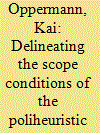

|
|
|
|
|
| Publication |
2014.
|
| Summary/Abstract |
The poliheuristic theory of foreign policy decision making would benefit from being clearer in spelling out the conditions under which it holds more or less analytic promise. The article makes the case that the concept of issue salience can help the theory address its shortcomings in this respect. In particular, the explanatory power of poliheuristic theory's two-stage model largely depends on the noncompensatory principle of major domestic political loss avoidance on the first stage of the model to simplify the choice set to be considered on the second stage. This is more likely to happen, however, in the case of issues that are highly salient to a government's selectorate than in the case of issues that are of low salience in the domestic arena. The poliheuristic theory should thus be more powerful if it is applied to domestic high-salience rather than low-salience decisions. These theoretical contentions are illustrated in a case study on the decision making of the British Labour government under Tony Blair in the fields of European security and defense policy and the single European currency.
|
|
|
|
|
|
|
|
|
|
|
|
|
|
|
|
| 3 |
ID:
078658
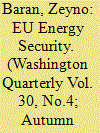

|
|
|
|
|
| Publication |
2007.
|
| Summary/Abstract |
The EU is internally divided on a range of topics. Hence there is still no European strategy to deal with a strong and determined Russia that uses control of energy supplies, transportation, and distribution to reestablish itself as a major world power
|
|
|
|
|
|
|
|
|
|
|
|
|
|
|
|
| 4 |
ID:
179389
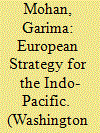

|
|
|
|
|
| Summary/Abstract |
While addressing a group of German diplomats in May 2020, the EU’s High Representative for Foreign Affairs Josep Borrell remarked, “we need a more robust strategy for China, which also requires better relations with the rest of democratic Asia.”1 In September 2020, the German government unexpectedly launched a comprehensive set of guidelines for engaging with the Indo-Pacific and announced that, together with France and the Netherlands, it will push for the EU to adopt a similar strategy. The debate around the Indo-Pacific has been gaining traction across the world, but Europe’s turn toward the region has surprised many—until almost a year ago, most European countries (except for France) were reluctant to even use the term “Indo-Pacific.” It is no coincidence that this recent embrace of the Indo-Pacific has come at a time when Europe-China relations have hit an all-time low.
|
|
|
|
|
|
|
|
|
|
|
|
|
|
|
|
| 5 |
ID:
122269
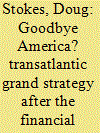

|
|
|
|
|
| Publication |
2013.
|
| Summary/Abstract |
As China rises, the popular wisdom is that the US is in inexorable relative economic decline. A rapid loss of US power would affect the national-security interests of its close allies, particularly the UK. However, Doug Stokes argues that America's decline is not as pronounced as is commonly assumed. Even after the crisis, it remains, fundamentally, economically sound and its strategic power in important parts of the world means it retains the tools to manage a potential 'hegemonic transition'. Nonetheless, the financial crisis has quickened structural shifts in transatlantic relations, which will inevitably have an impact on European strategy.
|
|
|
|
|
|
|
|
|
|
|
|
|
|
|
|
| 6 |
ID:
124992
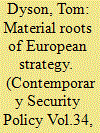

|
|
|
|
|
| Publication |
2013.
|
| Summary/Abstract |
This article undertakes a critical examination of the analytical leverage provided by the literature on strategic culture in explaining the development of the European Union's Common Security and Defence Policy (CSDP). It posits that patterns of progress and stasis in CSDP cannot be fully explained by processes of normative convergence and the resilience of national strategic cultures. Instead, the article argues that a focus on material power sheds greater light on the dynamics driving and hindering Europe's quest for military autonomy. It highlights how the 'balance of threat' is fostering both convergence and differentiation in the defence policies of Britain, France, and Germany. Through case studies of the development of British, French, and German policy towards CSDP and NATO, the article demonstrates the important roles played by energy dependency and geographical position in determining the willingness of European states to embed their defence policies in NATO/CSDP or pursue national strategic autonomy. The article argues that strategic culture can provide valuable insights into European defence cooperation; however, this contribution is best framed within the theoretical insights of neoclassical realism. By highlighting the nature of the variables determining the scope and depth of European defence cooperation, the article raises a number of policy implications for European security.
|
|
|
|
|
|
|
|
|
|
|
|
|
|
|
|
| 7 |
ID:
068446


|
|
|
| 8 |
ID:
123883
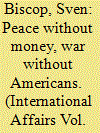

|
|
|
|
|
| Publication |
2013.
|
| Summary/Abstract |
Just as the shift of the American strategic focus to Asia and the Pacific forces strategic autonomy upon Europeans, the financial crisis limits their means. In the age of austerity, dispersed efforts and spending on secondary issues have become unaffordable. Prioritizing and making strategic choices have become more important than ever.
As no single European state can face all these challenges alone, a joint European strategy must assess where collective foreign and security policies can bring the most added value to the national effort. Through the European Union, Europeans have attempted as much in the 2003 European Security Strategy, but for lack of prioritization, the EU has so far underperformed. Yet the EU does have access to substantial means and possesses all the necessary instruments to pursue a comprehensive strategy.
The key to their effective use is a collective European strategic review, starting from the vital interests that all European states have in common. Two priorities stand out: making a new start in Europe's relations with its southern neighbours after the Arab Awakening, and deciding which responsibilities Europeans will assume as security providers outside their borders after the American 'pivot' to Asia.
|
|
|
|
|
|
|
|
|
|
|
|
|
|
|
|
| 9 |
ID:
128628


|
|
|
|
|
|
|
|